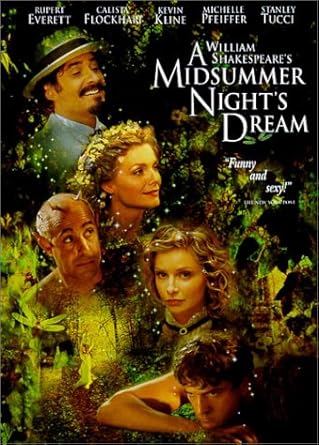Earlier this week I took my family to a Shakespeare event. My 16 year old daughter went with minimal eye rolling in part, I think, because she has some growing appreciation for the Bard. My wife went because it was something to do – something she could endure. She really doesn’t like Shakespeare. (Our son is out of town this week, so he did not go with us. His loss.) The event turned out to be rather disappointing. It was very mediocre. And I felt sorta’ bad about inflicting it upon my wife.
So we snuck out during the intermission.
When we got home, to make up for it, my daughter and I watched Joss Whedon’s version of Much Ado About Nothing (2011). And we liked it very much. And, still being in a Shakespearian sort of mood, she and I this evening watched the 1999 film version of A Midsummer Night’s Dream directed by Michael Hoffman and with an ensemble cast featuring Kevin Kline as Bottom, Michelle Pfeiffer and Rupert Everett as Titania and Oberon, Stanley Tucci as Puck, and Calista Flockhart, Anna Friel, Christian Bale, and Dominic West as the four lovers. This version of Shakespeare’s comedy is not my absolute favorite but I do like it very much.
I like it because of the sensitive way it treats the “clowns” Nick Bottom, Peter Quince, Francis Flute, Robin Starveling, Tom Snout, and Snug the Joiner. They are the “rude mechanicals” as Shakespeare wrote them – over the top and silly (though not quite to the scenery chewing level of Michael Keaton as Dogberry in Kenneth Branagh’s film Much Ado About Nothing (1993)). They are commoners hoping to impress the king on his wedding day with their amateur stage production about Pyramis and Thisbe. They are fools, yes, but they rise far above their common, low place and are given a great dignity.
Bottom the Weaver (Kevin Kline) is an ass (in more ways than one) but he is given a marvelous vision – beyond his ken or comprehension. And it isn’t played (just for) laughs. Bottom is changed (somewhat) by this dream.
I have had a most rare
say what
dream it was: man is but an ass, if he go
about to
expound this dream. Methought I was--there
is no man
can tell what. Methought I was,--and
methought I
had,--but man is but a patched fool, if
he will
offer to say what methought I had. The eye
of man hath
not heard, the ear of man hath not
seen, man's
hand is not able to taste, his tongue
to
conceive, nor his heart to report, what my dream
was. I will
get Peter Quince to write a ballad of
this dream:
it shall be called Bottom's Dream,
because it
hath no bottom; and I will sing it in the
latter end
of a play, before the duke:
peradventure,
to make it the more gracious, I shall
sing it at
her death.
And the other mechanicals prove themselves more than mere rustics in their performance during the wedding celebrations. Though the scene is comic – and drawn for laughs – these simpletons become brave and noble. Snug the Joiner becomes a brave and sensitive lion and wins the hearts of the dainty ladies. When their production threatens to fall apart, they react with quick wit, improvising, and demonstrating the keenness of their minds. When Sam Rockwell (in drag as Thisbe) begins his final speech in a high-pitched falsetto, I chortle because it IS funny, but by the end of his speech I am moved nearly to tears. The laughter is swallowed up in pathos.
As I said, it’s not my favorite Shakespearian film, it feels a little slow, a little sleepy. But I love those clowns, those fools.
And the other mechanicals prove themselves more than mere rustics in their performance during the wedding celebrations. Though the scene is comic – and drawn for laughs – these simpletons become brave and noble. Snug the Joiner becomes a brave and sensitive lion and wins the hearts of the dainty ladies. When their production threatens to fall apart, they react with quick wit, improvising, and demonstrating the keenness of their minds. When Sam Rockwell (in drag as Thisbe) begins his final speech in a high-pitched falsetto, I chortle because it IS funny, but by the end of his speech I am moved nearly to tears. The laughter is swallowed up in pathos.
As I said, it’s not my favorite Shakespearian film, it feels a little slow, a little sleepy. But I love those clowns, those fools.
'That, of course, is the great secret of the
successful fool – that he is no fool at all.'
Isaac Asimov, Guide
to Shakespeare


No comments:
Post a Comment